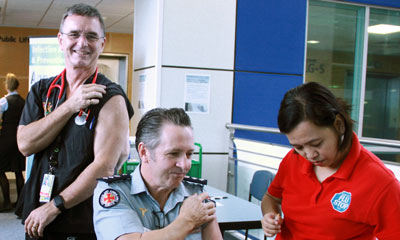Winter is coming – we’re ready, are you?

Metro North’s head of Emergency Departments Dr Colin Myers and Queensland Ambulance Service Director of Clinical Quality and Patient Safety Tony Hucker received their flu vaccination at the Royal Brisbane and Women’s Hospital.
Queenslanders are being urged to save their Emergency Departments and ambulances for emergencies only as frontline healthcare workers brace for another busy flu season.
Director of Critical Care at Australia’s largest hospital and health service, Dr Colin Myers said Emergency Department staff are preparing for an influx of patients ahead of the notoriously busy winter months.
“Already this year across Metro North hospitals alone, we have seen 1583 patients come through our EDs with flu like symptoms. The flu has certainly come early this year and now is the time for the community to act,” Dr Myers said.
“We know the best way to avoid ending up in ED this winter is to be prepared. Thousands of our frontline staff are being vaccinated over the coming weeks. We’re encouraging every Queenslander to do the same.”
Dr Myers said Emergency Departments across Brisbane experienced an unprecedented demand for health services last year, which put significant strain on frontline staff.
“Last year our four EDs saw a combined average of 892 patients a day from May to September. You can just imagine the impact this has on staff and patients who need urgent care. We don’t want to see a repeat of this again,” Dr Myers said.
“While we will never turn away anyone requiring medical treatment, patients needing life-saving treatment will always be seen first. This means that if you present to an ED with a condition that could be better managed by your GP, you may wait for some time before being seen.
“We ask you to please be patient if you need to wait longer than normal so our staff can treat most serious cases first.
“To avoid an unnecessary trip to the ED this winter make an appointment with your family GP, ensure all your vaccinations are up to date and get to know your local pharmacist.”
Director of Clinical Quality and Patient Safety, Queensland Ambulance Service Tony Hucker said calling an ambulance for flu like symptoms could divert valuable emergency resources away from more critical patients.
“Before calling Triple Zero (000) consider if it is an emergency situation or if your symptoms can be treated by your family GP,” Mr Hucker said.
“If it’s not an emergency, you could be utilising resources that could have been valuable to a critical patient in need.”
Public Health physician Dr James Smith said last year’s flu numbers highlight the importance of immunisation.
Last year’s flu season saw a 60 per cent increase in confirmed cases in Queensland compared with 2014,” Dr Smith said.
“Metro North Hospital and Health Service area led the state with 7,278 laboratory-confirmed cases in 2015, up 70 percent from 2014.”
“Flu viruses are always changing, which is why it’s important to have a flu shot every year. It’s the most effective protection against the flu. This year the funded vaccine has been enhanced to cover four different circulating strains.”
Dr Smith said 2514 laboratory confirmed cases of influenza have already been recorded in Queensland this year.
“Now is the time to get vaccinated. Protecting yourself from flu also protects the people around you who are more vulnerable to serious flu illness. It may make your illness milder if you do get sick and most importantly, help you avoid the ED.”
Emergency
In a medical emergency call Triple Zero (000) or go your nearest hospital emergency department
Non-urgent
If it is not life-threatening, please contact your GP. If you are looking for a GP in your area, please access the National Health Service Directory at www.nhsd.com.au
Health advice
Call 13 Health (13 43 25 84) for medical advice 24 hours a day, 7 days a week.
